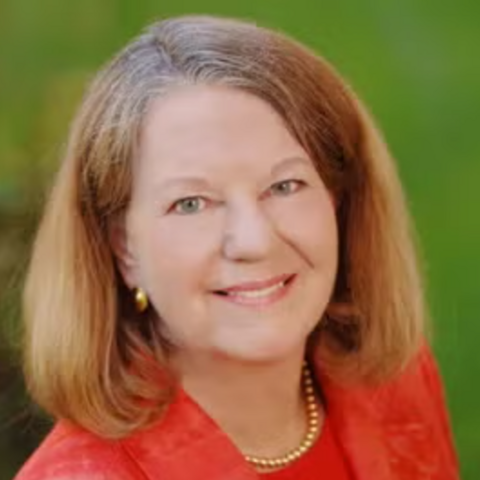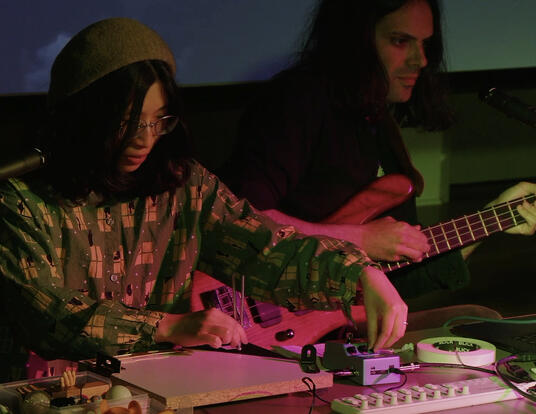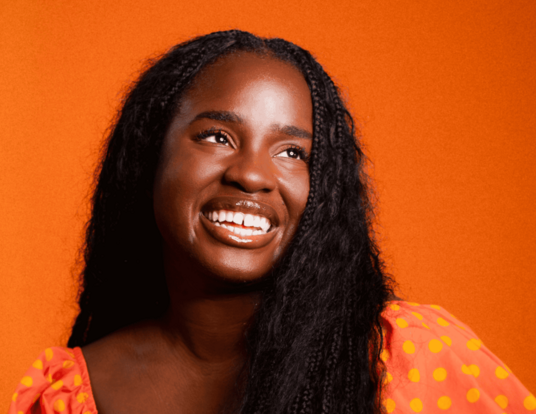Balancing Books and Brownies
For Lowery, RA duties are a vital counterweight to the grind—and solitude—of PhD work
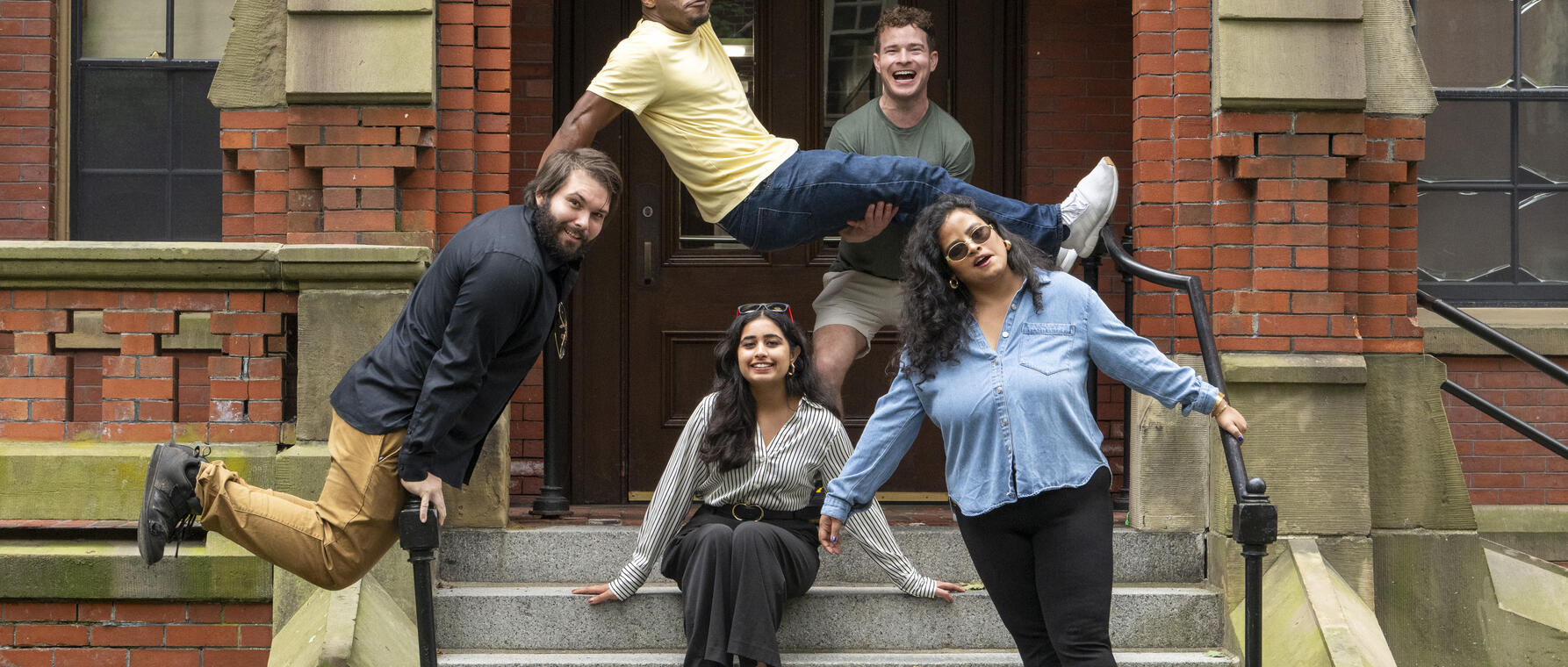
Students at the Harvard Kenneth C. Griffin Graduate School of Arts and Sciences (Harvard Griffin GSAS) spend countless hours each week on courses, teaching, exams, research, and writing. Dissertations can become all-encompassing, particularly in the later years of a doctoral program, leading to feelings of isolation and even burnout. Ironically, the immense demands of PhD work inspired candidate Daniel Lowery to take on the added responsibilities of a resident adviser (RA) in Harvard Griffin GSAS’s residence halls.
“Heavy loads are easier to bear when they're well balanced,” he says. “It does take time to organize events, help people with lockouts, attend meetings, and check in with my residents but I find that work makes the PhD side easier. I could spend 60 hours a week alone in a cubicle doing research. The duties of the RA are more interpersonal. They're more social and relaxed.”
Keeping balance in his life—and providing a little for the residents he serves—is what inspires Lowery’s work in Harvard Griffin GSAS’s Child Hall. Whether it’s providing a break from the grind over brownies fresh from the oven or organizing a celebration of campus engagement that ends with tears of laughter and joy, Lowery, like his fellow RAs, helps the members of the School’s vibrant residential community to flourish—and benefits both personally and professionally from its amazing diversity of backgrounds and perspectives.
Cannoli for Champions
Being an RA is socially invigorating, mentally rejuvenating, and intellectually enlightening. It’s also just plain fun. One of the ways Lowery puts healthy boundaries around his work life—and that of his residents—is by scheduling his well-loved “brownie events” in the evenings.
“By 6:00 p.m., I’ve spent 10 or 12 hours working,” he says. “I know I have a brownie event at 8:00 p.m., so I have to start baking. That pulls me out of a situation where I would have been beating my head against my computer for the next hour or so, barely eking out a paragraph or two of writing or finishing a couple extra pages of reading.” Lowery prefers the high-end Ghirardelli chocolate brownie mix. So do his residents. “When they smell the brownies, everybody starts gathering, chatting, and hanging out,” he says. “It's hard to beat a brownie fresh out of the oven.”
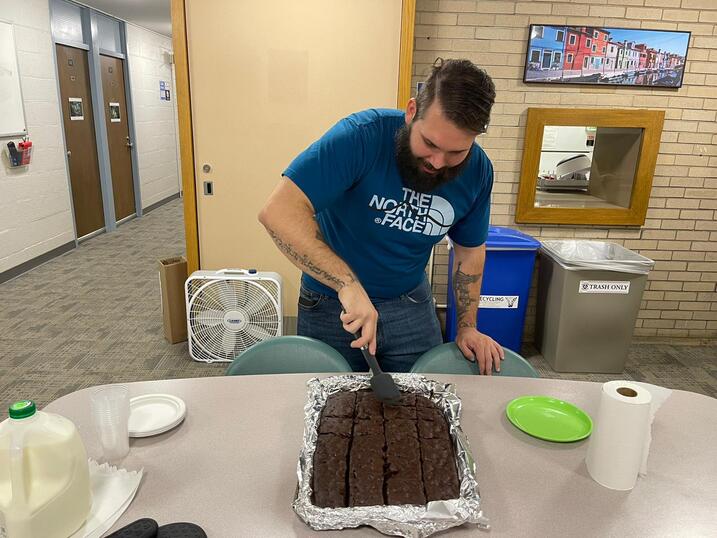
The best time Lowery ever had as an RA may have been facilitated by another sinfully rich treat. After the residents on his floor won a competition for the highest percentage of submitted RA evaluations among their counterparts on Child Hall’s other floors, Lowery organized “Cannoli for Champions” to celebrate the victory.
“I got a bunch of cannoli from Mike's Pastries in Harvard Square and brought them into the kitchen lounge, my favorite space in the hall,” he says. “The whole floor showed up. We must have hung out in the kitchen lounge for hours as I told folks from Nigeria, Germany, and all over the world weird stories of the Florida culture I grew up in. (Everybody loves a good alligator story.) We laughed hysterically. I could hardly breathe.”
In addition to being creative and resourceful in organizing activities that keep people connected, Lowery is also required to be available to residents—whether by email, phone, or in person. “One of my residents wanted to go to a conference in Dallas, Texas,” he remembers. “He’s an international student very concerned about the cost, the logistics, and, given the gun violence in the US, personal safety. So, I walked him through booking the hotel and the flights, looking at transportation options, and gave him safety tips. It’s not life-changing but it’s an important conference for his professional life and if we hadn't talked he probably wouldn't have gone.”
Everybody loves a good alligator story.
Director of Residential Life Ashley Skipwith says that RAs like Lowery also need to help with more serious concerns. “In addition to their roles as community builders, RAs are also liaisons between residents and the managers of the facilities,” she says. “They deal with emergencies, refer students to counseling and mental health resources, and of course, connect with us here at the Office of Residential Life.”
Beyond the Boundaries of Campus—and Discipline
Child Hall, where Lowery lives and serves, is one of four residence halls at Harvard Griffin GSAS. Following the construction of Conant and Perkins Hall in the 1890s, Child and Richards were designed by renowned Bauhaus architect Walter Gropius and constructed in 1950. The residences can house more than 400 occupants, mostly Harvard Griffin GSAS students, although a small group from other graduate schools at the University live there as well. Unlike Lowery, most residents come from somewhere other than the United States. “This year, about 61 percent of the students in the residence halls are from countries other than the US,” says Skipwith.
Lowery says that the residence halls are one of the most diverse places at Harvard and the connections he’s made there extend far beyond the boundaries of campus. “I've made friends with people from Nigeria, Nepal, Sri Lanka, and Pakistan,” says the burgeoning political scientist, who travels widely. “Now, when I go to Nigeria, I have friends I can call. When I go to Pakistan and want to do some mountaineering I have friends to call. When I'm in Thailand, where my fiancée lives, I have residents who will stop by and visit. So, for sure, I've met people from a lot of different cultures and backgrounds.”
That said, Lowery’s program in Harvard’s Department of Government is also extremely diverse, attracting students from all over the world. What makes the residence halls different is an intellectual culture fostered by students who study a wide range of academic disciplines.
“If I was in my department, I would still make friends from India, Pakistan, Australia, etc. But I would never, ever be close friends with a chemist, or a physicist, or a philosopher. But now I have philosophers who will probably come to my wedding.”
The diversity of thought Lowery encounters among his fellow residents has also deepened and enriched his own research on succession in monarchical regimes. Until recently, Lowery had considered primarily the destructive impact of violent conflict during succession struggles. Then he got to know one of his Child Hall residents from Nigeria, where regional chieftains are elected when a previous one dies. In one case, the chieftainship had been vacant for several years, with no violence but serious impact on the daily lives of citizens. “I hadn't really thought about the more mundane effects of an interregnum, where there's nobody on the throne,” Lowery says. “Things just ceased working right, not because of destructive force, but just because there was nobody at the wheel of the ship.”
It's so much easier to take a break from work and spend time with others when they're right there in your hall.
Connecting with residents from different fields informs Lowery’s experience as a PhD student in ways that go beyond his research. He says it’s been particularly valuable to see the relationships that other students have with their faculty advisors. “I meet with some of my advisors once or twice each term,” Lowery says. “People who work in the natural sciences, they're meeting once or twice a week, one-on-one and in team meetings. I’ve learned to appreciate the trade-offs between PhD advising approaches with respect to advisor involvement and freedom for advisees to chart their research paths.” Being a resident advisor also helps with professional development. “You get to see the different approaches to publication, conferences, peer review, and work with colleagues,” he says. “There are also many people in halls moving into the private sector who share ways of thinking about and preparing to pivot from academia to business.”
Friends You Can Count On
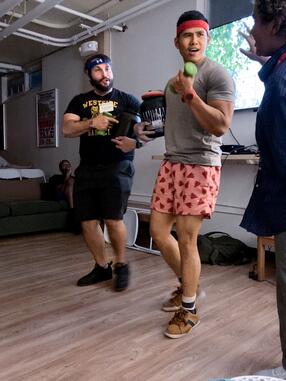
Lowery became a resident well before he became an RA. Beyond the diversity and intellectual stimulation, he says the reason he chose to spend four of the last six years in on-campus housing is simple: friends. The fact that the people he lives with study fields different from his own enables him to forge more genuine relationships.
“You do have friends in your department but they're your colleagues,” he explains. “You're working with them. You might be co-authoring with them. They might even be your future reviewers. But when you're in the residence halls with people not in your field, there's no strategic interaction. I’m not networking; I'm hanging out with my buddy, grabbing coffee, playing video games, watching a movie, or just catching up. It’s a friendship you can count on and trust to a higher degree.”
As an RA, Lowery gets a room and up to 10 meals a week at the Commons at Lehman Hall. He also gains valuable leadership, administrative, and interpersonal skills. But, as is often the case with RAs, it was the community life in the residence halls that inspired Lowery to become an advisor—the consistent casual contact with friends and neighbors in the hallways, kitchens, and even the bathrooms that make a place feel like home.
“It's so much easier to take a break from work and spend time with others when they're right there in your hall,” he says. “There's food. There's music. There are movies. It's all just outside your door. You don't even have to put on your shoes!”
Join the resident advisor team! Apply on Slideroom by January 31 to be a 2025–2026 RA.
Get the Latest Updates
Join Our Newsletter
Subscribe to Colloquy Podcast
Simplecast


